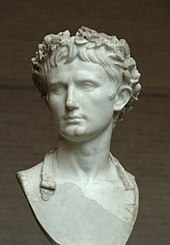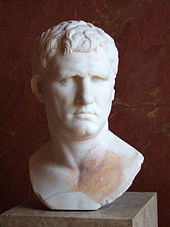27 BC Chr.
Portal history | Portal Biographies | Current events | Annual calendar
◄ |
2nd century BC Chr. |
1st century BC Chr. |
1st century |
►
◄ | 40s BC Chr. | 30s BC Chr. | 20s v. Chr. | 10s v. Chr. |
0er v. Chr. |
►
◄◄ | ◄ | 30 BC Chr. | 29 BC Chr. | 28 BC Chr. | 27 BC Chr. |
26 BC Chr. |
25 BC Chr. |
24 BC Chr. |
► |
►►
| 27 BC Chr. | |
|---|---|
 Octavian is awarded the honorary title Augustus by the Senate . |
 Marcus Vipsanius Agrippa erects a pantheon on the Field of Mars . |
| The Roman Republic is replaced by the Principate . | |
| 27 BC In other calendars | |
| Vikram Sambat (Nepalese Calendar) | 30/31 (turn of the year April) |
| Buddhist calendar | 517/518 (southern Buddhism); 516/517 (alternative calculation according to Buddha's Parinirvana ) |
| Chinese calendar | 44th (45th) cycle , year of the wood-horse甲午 ( at the beginning of the year water-snake 癸巳) |
| Greek calendar | 1./2. Year of the 188th Olympiad |
| Jewish calendar | 3734/35 (September 4th / 5th) |
| Roman calendar | from urbe condita DCCXXVII (727) |
| Seleucid era | Babylon: 284/285 (turn of the year April); Syria: 285/286 (turn of the year October) |
| Spanish era | 12 |
Events
Politics and world events
- January 13th : Octavian gives back to the Roman Senate and the people all privileges he had been granted during the Civil War , thus formally restoring the republican order. In return, the Senate, the representative body of the Rome elite ( weakened by the fighting since Caesar's death) , gives him authority over all provinces that are still unsettled .
- January 16 : The Senate gives Octavian the title of Augustus . From then on he went down in history as the first Roman emperor with this name . The Roman Republic is thus inconspicuously transitioning to the principate , although it is formally restored.
- Octavian receives proconsular authority (authority over the unsettled provinces); in this way he secured military command without affecting the republican tradition.
- Administrative reform of Augustus, who set up new provinces in the Roman Empire.
Religion and culture
- Marcus Vipsanius Agrippa erects a pantheon on the Field of Mars in Rome for the worship of all gods.
Died
- Marcus Terentius Varro , Roman scientist (* 116 BC )
- around 27 BC Chr .: Gaius Cornelius Gallus , Roman politician and poet (* around 70 BC)
- around 27 BC Chr .: Marcus Valerius Messalla Rufus , Roman politician (* around 103 BC)
